Ditapis dengan

Innovation and dynamic capabilities in a traditional service sector Evidence …
The purpose of this paper is to analyse the types and the nature of innovations developed by small companies in a traditional service sector, as well as the ways that innovations impact their strategic capabilities.
- Edisi
- Vol. 6 No. 3, 2011 pp. 320-341
- ISBN/ISSN
- 1746-5265
- Deskripsi Fisik
- 24 p.
- Judul Seri
- Baltic Journal of Management
- No. Panggil
- ATC MR TSE i

Implementing an intellectual capital framework in practice
The purpose of this paper is to analyse the transition from measurement to management in relation to intellectual capital (IC). It aims to understand the relationships between measurement of IC and operational activities, strategies and context.
- Edisi
- Vol. 14 No. 1, 2013 pp. 69-83
- ISBN/ISSN
- 1469-1930
- Deskripsi Fisik
- 17 p.
- Judul Seri
- Journal of Intellectual Capital
- No. Panggil
- ATC MR DEM i

Exploring the military contribution to KBD through leadership and values
This paper aims to present an exploration of the contributions of the military organization to knowledge-based development within and beyond the boundaries of its home country.
- Edisi
- VOL. 14 NO. 2 2010, pp. 314-330
- ISBN/ISSN
- 1367-3270
- Deskripsi Fisik
- 19 p.
- Judul Seri
- Journal of Knowledge Management
- No. Panggil
- ATC MR BEN e

Knowledge based decision support in airport terminal design
The state of the art in airport terminal design has essentially remained unchanged since the 1970s, relying on the use of detailed simulation together with empirical and statistical formulae for sizing the terminal. Air transport has altered considerably since then, with increased use of air travel for both business and leisure, together with the increased use of 'hub' terminals in which the te…
- Edisi
- 1995, Vol. 19,pp. 165-1185
- ISBN/ISSN
- -
- Deskripsi Fisik
- 22 p.
- Judul Seri
- Transportation Planning and Technology
- No. Panggil
- ATC LO FOS k

Strategically Integrating Knowledge Management Initiatives
- Edisi
- Vol. 8 No.1 2004
- ISBN/ISSN
- 1367-3270
- Deskripsi Fisik
- 17 p
- Judul Seri
- -
- No. Panggil
- ATC MG JOS s
- Edisi
- Vol. 8 No.1 2004
- ISBN/ISSN
- 1367-3270
- Deskripsi Fisik
- 17 p
- Judul Seri
- -
- No. Panggil
- ATC MG JOS s

Process Metaphor And Knowledge Management
This paper attempts to develop a metaphor to explain knowledge and perhaps the basic construct of knowledge management, in a way that might add to the practical understanding of organisational knowledge.
- Edisi
- Vol. 34 No. 6 2005
- ISBN/ISSN
- 0368-492X
- Deskripsi Fisik
- 14 p
- Judul Seri
- -
- No. Panggil
- ATC MG ROW p

Managing Organizational Knowledge As A Strategic Asset
Knowledge is a resource that is valuable to an organization's ability to innovate and compete. It exists within the individual employees, and also in a composite sense within the organization. According to the resourcebased view of the firm (RBV), strategic assets are the critical determinants of an organization's ability to maintain a sustainable competitive advantage. This paper will combine …
- Edisi
- Vol. 5 No. 1 2001
- ISBN/ISSN
- 1367-3270
- Deskripsi Fisik
- 20 p
- Judul Seri
- Jurnal of Knowledgw Management
- No. Panggil
- ATC MG BOL m

Knowledge Management Capability-Defining Knowledge Assets
- Edisi
- VOL. 11 NO. 6 2007
- ISBN/ISSN
- 1367-3270
- Deskripsi Fisik
- 19 p
- Judul Seri
- Jurnal of Knowledge Management
- No. Panggil
- ATC MG FRE k
- Edisi
- VOL. 11 NO. 6 2007
- ISBN/ISSN
- 1367-3270
- Deskripsi Fisik
- 19 p
- Judul Seri
- Jurnal of Knowledge Management
- No. Panggil
- ATC MG FRE k

Service innovation through dynamic knowledge management
The purpose of this paper is to report the findings of a study on the management of intellectual capital in Fortune Motors. It intends to highlight how an automobile service firm apply dynamic knowledge management concept to create new service processes which resulted in breaking through the bottleneck of profit loss
- Edisi
- Vol. 109 No. 3, 2009 pp. 322-337
- ISBN/ISSN
- 0263-557
- Deskripsi Fisik
- 19P
- Judul Seri
- Industrial Management & Data Systems
- No. Panggil
- ATC MG SHA s

Knowledge Flow‐Based Business Process Redesign- Applying A Knowledge Map To…
Knowledge flows and business processes cannot be separated because knowledge is inputted and outputted through business processes. Knowledge flows inherit the feature and appearance of corresponding business processes; therefore, one can identify problems within business processes by analyzing corresponding knowledge flows. The methodology is composed of the following sections: knowledge mappin…
- Edisi
- VOL. 11 NO. 3 2007
- ISBN/ISSN
- 1367-3270
- Deskripsi Fisik
- 24 p
- Judul Seri
- Jurnal of Knowledge Management
- No. Panggil
- ATC MG YOO k

Intellectual Capital And Knowledge Management Effectiveness
- Edisi
- Vol. 41 Iss 8 pp. 771 - 781
- ISBN/ISSN
- 0025-1757
- Deskripsi Fisik
- 14 p
- Judul Seri
- Management Decision
- No. Panggil
- ATC MG MAR i
- Edisi
- Vol. 41 Iss 8 pp. 771 - 781
- ISBN/ISSN
- 0025-1757
- Deskripsi Fisik
- 14 p
- Judul Seri
- Management Decision
- No. Panggil
- ATC MG MAR i

Five Critical Knowledge Management Organizational Themes
This study is motivated by the question ‘‘how do organizational routines influence the three knowledge management processes of acquisition, creation, utilization and sharing?’’ and accordingly it seeks to address this issue.
- Edisi
- Vol. 14 No.4 2010
- ISBN/ISSN
- 1367-3270
- Deskripsi Fisik
- 17 p
- Judul Seri
- -
- No. Panggil
- ATC MG PET f

Dilemmas in Knowledge Management
This paper aims to discuss some of the debates that have surrounded knowledge management as a field since its inception in 1990s from the perspective of the dilemmas that they have raised regarding: the notion of knowledge management as a field in relationship to other cognate fields such as information management, and the implications introduced by different approaches and perspectives on mana…
- Edisi
- Vol. 29 No. 4/5 2008
- ISBN/ISSN
- 0143-5124
- Deskripsi Fisik
- 24 p
- Judul Seri
- Library Management
- No. Panggil
- ATC MG VAS d

A Business Process Outsourcing Framework Based on Businessprocess Management …
Nowadays, outsourcing has proved to be an enterprise management strategy in the face of globalization and growing competition. The decision to outsource a business process for any organization has far-reaching consequences and risks. The purpose of this paper is to analyse the impact of business process management (BPM) and knowledge management (KM) on reduction of outsourcing risks and pitfalls.
- Edisi
- -
- ISBN/ISSN
- 1463-7154
- Deskripsi Fisik
- 20 p
- Judul Seri
- Business Proses Manajemen
- No. Panggil
- ATC MG MAH a

Laporan pelaksanaan kegiatan workshop knowledge management system and literac…
- Edisi
- 8 Desember 2017
- ISBN/ISSN
- -
- Deskripsi Fisik
- 13 p. + atc., 21 cm.
- Judul Seri
- -
- No. Panggil
- IPC REP IND k
- Edisi
- 8 Desember 2017
- ISBN/ISSN
- -
- Deskripsi Fisik
- 13 p. + atc., 21 cm.
- Judul Seri
- -
- No. Panggil
- IPC REP IND k

Understanding dynamic capabilities through knowledge management
- Edisi
- VOL. 10 NO. 4 2006, pp. 59-71
- ISBN/ISSN
- 1367-3270
- Deskripsi Fisik
- 13 p.
- Judul Seri
- JOURNAL OF KNOWLEDGE MANAGEMENT
- No. Panggil
- ATC MG NIE u
- Edisi
- VOL. 10 NO. 4 2006, pp. 59-71
- ISBN/ISSN
- 1367-3270
- Deskripsi Fisik
- 13 p.
- Judul Seri
- JOURNAL OF KNOWLEDGE MANAGEMENT
- No. Panggil
- ATC MG NIE u

Knowledge development and transfer in a mindful projectorganization
- Edisi
- Vol. 6 Iss 2 pp. 236 - 250
- ISBN/ISSN
- 1753-8378
- Deskripsi Fisik
- 18 p.
- Judul Seri
- International Journal of Managing Projects in Business
- No. Panggil
- ATC MG AND k
- Edisi
- Vol. 6 Iss 2 pp. 236 - 250
- ISBN/ISSN
- 1753-8378
- Deskripsi Fisik
- 18 p.
- Judul Seri
- International Journal of Managing Projects in Business
- No. Panggil
- ATC MG AND k

Know ways in knowledge management
- Edisi
- Vol. 12 Iss 2 pp. 152 - 168
- ISBN/ISSN
- 0969-6474
- Deskripsi Fisik
- 19 p.
- Judul Seri
- The Learning Organization
- No. Panggil
- ATC MG BLA k
- Edisi
- Vol. 12 Iss 2 pp. 152 - 168
- ISBN/ISSN
- 0969-6474
- Deskripsi Fisik
- 19 p.
- Judul Seri
- The Learning Organization
- No. Panggil
- ATC MG BLA k
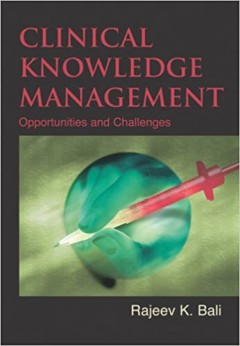
Clinical knowledge management: opportunities and challenges
- Edisi
- -
- ISBN/ISSN
- 1-59140-593-9
- Deskripsi Fisik
- xviii, 334 p.
- Judul Seri
- -
- No. Panggil
- TXT MG BAL c
- Edisi
- -
- ISBN/ISSN
- 1-59140-593-9
- Deskripsi Fisik
- xviii, 334 p.
- Judul Seri
- -
- No. Panggil
- TXT MG BAL c
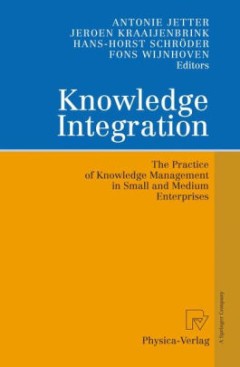
Knowledge integration: the paractice of knowledge management in small and med…
- Edisi
- -
- ISBN/ISSN
- 978-3-7908-1586-3
- Deskripsi Fisik
- vi, 203 p.
- Judul Seri
- -
- No. Panggil
- TXT MG JET i
- Edisi
- -
- ISBN/ISSN
- 978-3-7908-1586-3
- Deskripsi Fisik
- vi, 203 p.
- Judul Seri
- -
- No. Panggil
- TXT MG JET i

Capturing leadership tacit knowledge in conversations with leaders
- Edisi
- Vol. 28 Iss 7 pp. 646 - 663
- ISBN/ISSN
- 0143-7739
- Deskripsi Fisik
- 20 p.
- Judul Seri
- Leadership & Organization Development Journal
- No. Panggil
- ATC LE JAN c
- Edisi
- Vol. 28 Iss 7 pp. 646 - 663
- ISBN/ISSN
- 0143-7739
- Deskripsi Fisik
- 20 p.
- Judul Seri
- Leadership & Organization Development Journal
- No. Panggil
- ATC LE JAN c

Five critical knowledge management organizational themes
- Edisi
- VOL. 14 NO. 4 2010, pp. 507-523
- ISBN/ISSN
- 1367-3270
- Deskripsi Fisik
- 17 p., + atc., 21 cm.
- Judul Seri
- JOURNAL OF KNOWLEDGE MANAGEMENT
- No. Panggil
- ATC MG SUN f
- Edisi
- VOL. 14 NO. 4 2010, pp. 507-523
- ISBN/ISSN
- 1367-3270
- Deskripsi Fisik
- 17 p., + atc., 21 cm.
- Judul Seri
- JOURNAL OF KNOWLEDGE MANAGEMENT
- No. Panggil
- ATC MG SUN f

Effective societal knowledge management
- Edisi
- Vol. 11 Iss 5 pp. 141 - 156
- ISBN/ISSN
- -
- Deskripsi Fisik
- 18 p.
- Judul Seri
- Journal of Knowledge Management
- No. Panggil
- ATC MG WII e
- Edisi
- Vol. 11 Iss 5 pp. 141 - 156
- ISBN/ISSN
- -
- Deskripsi Fisik
- 18 p.
- Judul Seri
- Journal of Knowledge Management
- No. Panggil
- ATC MG WII e

Designing a knowledge management performance framework
- Edisi
- Volume 4 . Number 4 . 2000 . pp. 303±310
- ISBN/ISSN
- 1367-3270
- Deskripsi Fisik
- 8 p.
- Judul Seri
- Journal of Knowledge Management
- No. Panggil
- ATC MG GOO d
- Edisi
- Volume 4 . Number 4 . 2000 . pp. 303±310
- ISBN/ISSN
- 1367-3270
- Deskripsi Fisik
- 8 p.
- Judul Seri
- Journal of Knowledge Management
- No. Panggil
- ATC MG GOO d

A strategy for knowledge management
- Edisi
- Vol. 11 Iss 6 pp. 3 - 15
- ISBN/ISSN
- -
- Deskripsi Fisik
- 16 p., + atc., 21 cm.
- Judul Seri
- Journal of Knowledge Management
- No. Panggil
- ATC MG GRE s
- Edisi
- Vol. 11 Iss 6 pp. 3 - 15
- ISBN/ISSN
- -
- Deskripsi Fisik
- 16 p., + atc., 21 cm.
- Judul Seri
- Journal of Knowledge Management
- No. Panggil
- ATC MG GRE s

Enhancing knowledge management
- Edisi
- Vol. 33 Issue 8
- ISBN/ISSN
- 0258-0543
- Deskripsi Fisik
- 5 p .
- Judul Seri
- Strategic Direction
- No. Panggil
- ATC MG ANO k
- Edisi
- Vol. 33 Issue 8
- ISBN/ISSN
- 0258-0543
- Deskripsi Fisik
- 5 p .
- Judul Seri
- Strategic Direction
- No. Panggil
- ATC MG ANO k

Does big data mean big knowledge?: knowledge management perspectives on big d…
- Edisi
- Vol. 21 Iss 1
- ISBN/ISSN
- -
- Deskripsi Fisik
- 9 p.
- Judul Seri
- Journal of Knowledge Management
- No. Panggil
- ATC MG PAU d
- Edisi
- Vol. 21 Iss 1
- ISBN/ISSN
- -
- Deskripsi Fisik
- 9 p.
- Judul Seri
- Journal of Knowledge Management
- No. Panggil
- ATC MG PAU d

Demystifying knowledge management
- Edisi
- Vol. 10 Iss 2 pp. 96 - 99
- ISBN/ISSN
- -
- Deskripsi Fisik
- 6 p.
- Judul Seri
- Business Strategy Series
- No. Panggil
- ATC MG PIL d
- Edisi
- Vol. 10 Iss 2 pp. 96 - 99
- ISBN/ISSN
- -
- Deskripsi Fisik
- 6 p.
- Judul Seri
- Business Strategy Series
- No. Panggil
- ATC MG PIL d

Knowledge management: strategy or software?
- Edisi
- Vol. 38 Iss 9
- ISBN/ISSN
- 0025-1747
- Deskripsi Fisik
- 8 p.
- Judul Seri
- Management Decision
- No. Panggil
- ATC MG BEC k
- Edisi
- Vol. 38 Iss 9
- ISBN/ISSN
- 0025-1747
- Deskripsi Fisik
- 8 p.
- Judul Seri
- Management Decision
- No. Panggil
- ATC MG BEC k

Knowledge management, innovation and firm performance
- Edisi
- VOL. 9 NO. 3 2005
- ISBN/ISSN
- 1367-3270
- Deskripsi Fisik
- 28 p .
- Judul Seri
- Journal of Knowledge Management
- No. Panggil
- ATC MG DAR k
- Edisi
- VOL. 9 NO. 3 2005
- ISBN/ISSN
- 1367-3270
- Deskripsi Fisik
- 28 p .
- Judul Seri
- Journal of Knowledge Management
- No. Panggil
- ATC MG DAR k
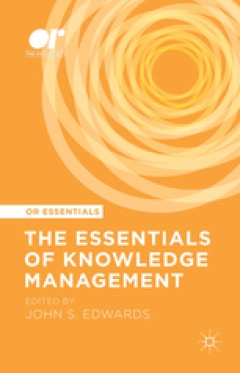
the Essentials of knowledge management
- Edisi
- -
- ISBN/ISSN
- 978-1-137-55210-5
- Deskripsi Fisik
- x, 372 p.
- Judul Seri
- -
- No. Panggil
- TXT MG EDW e
- Edisi
- -
- ISBN/ISSN
- 978-1-137-55210-5
- Deskripsi Fisik
- x, 372 p.
- Judul Seri
- -
- No. Panggil
- TXT MG EDW e
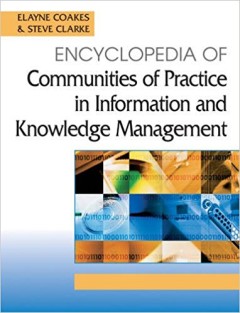
Encyclopedia of communities of practice in information knowledge management
- Edisi
- -
- ISBN/ISSN
- 1-59140-558-0
- Deskripsi Fisik
- xxviii, 601 p.
- Judul Seri
- -
- No. Panggil
- TXT MG COA e
- Edisi
- -
- ISBN/ISSN
- 1-59140-558-0
- Deskripsi Fisik
- xxviii, 601 p.
- Judul Seri
- -
- No. Panggil
- TXT MG COA e
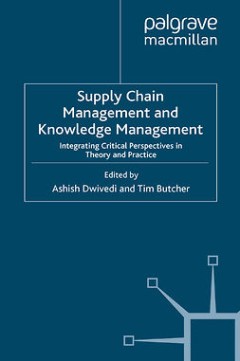
Supply chain management and knowledge management
- Edisi
- -
- ISBN/ISSN
- 978-0-230-23495-6
- Deskripsi Fisik
- xxx, 309 p.
- Judul Seri
- -
- No. Panggil
- TXT MG DWI s
- Edisi
- -
- ISBN/ISSN
- 978-0-230-23495-6
- Deskripsi Fisik
- xxx, 309 p.
- Judul Seri
- -
- No. Panggil
- TXT MG DWI s
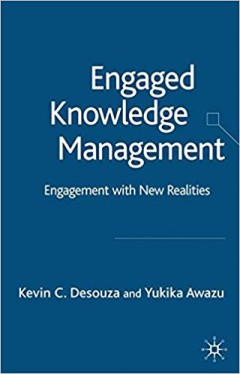
Engaged knowledge management : engagement with new realities
- Edisi
- -
- ISBN/ISSN
- 978-0-230-00607-2
- Deskripsi Fisik
- xiv, 240 p.
- Judul Seri
- -
- No. Panggil
- TXT MG DES e
- Edisi
- -
- ISBN/ISSN
- 978-0-230-00607-2
- Deskripsi Fisik
- xiv, 240 p.
- Judul Seri
- -
- No. Panggil
- TXT MG DES e

Knowledge management systems : information and communication technologies for…
- Edisi
- -
- ISBN/ISSN
- 978-3-540-24779-1
- Deskripsi Fisik
- xiv, 635 p.
- Judul Seri
- -
- No. Panggil
- TXT MG MAI k
- Edisi
- -
- ISBN/ISSN
- 978-3-540-24779-1
- Deskripsi Fisik
- xiv, 635 p.
- Judul Seri
- -
- No. Panggil
- TXT MG MAI k

Enterprise risk management in international construction operations
- Edisi
- -
- ISBN/ISSN
- 978-981-287-549-5
- Deskripsi Fisik
- -
- Judul Seri
- -
- No. Panggil
- TXT MG Zha e
- Edisi
- -
- ISBN/ISSN
- 978-981-287-549-5
- Deskripsi Fisik
- -
- Judul Seri
- -
- No. Panggil
- TXT MG Zha e

Ship knowledge: a modern encyclopedia
- Edisi
- -
- ISBN/ISSN
- 90-806330-2-x
- Deskripsi Fisik
- -
- Judul Seri
- -
- No. Panggil
- TXT PO Dok s
- Edisi
- -
- ISBN/ISSN
- 90-806330-2-x
- Deskripsi Fisik
- -
- Judul Seri
- -
- No. Panggil
- TXT PO Dok s
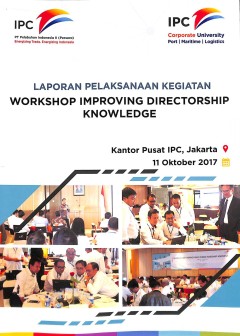
Laporan Pelaksanaan Kegiatan : Workshop Improving Directorship Knowledge
- Edisi
- 11 Oktober 2017
- ISBN/ISSN
- -
- Deskripsi Fisik
- 17 p., + atc., 21 cm.
- Judul Seri
- -
- No. Panggil
- IPC REP 2017 IMP i
- Edisi
- 11 Oktober 2017
- ISBN/ISSN
- -
- Deskripsi Fisik
- 17 p., + atc., 21 cm.
- Judul Seri
- -
- No. Panggil
- IPC REP 2017 IMP i
The role of knowledge management in corporate
- Edisi
- Knowledge Management Summit 2017 Report
- ISBN/ISSN
- -
- Deskripsi Fisik
- 6 pages
- Judul Seri
- -
- No. Panggil
- PPT PO ELV t
- Edisi
- Knowledge Management Summit 2017 Report
- ISBN/ISSN
- -
- Deskripsi Fisik
- 6 pages
- Judul Seri
- -
- No. Panggil
- PPT PO ELV t

Converting knowledge into value Gaining insights from service dominant logic …
The purpose of this paper is to describe the conversion of knowledge into value by examining the confluence of service-dominant logic (S-D logic), supply chain management (SCM), human resource management (HRM), and neuroeconomics. S-D logic suggests that knowledge is the raw material of value creation. SCM provides an organized foundation to study the conversion of raw materials into value. HRM…
- Edisi
- Vol. 44 No. 8/9, 2014
- ISBN/ISSN
- -
- Deskripsi Fisik
- 19 p.
- Judul Seri
- International Journal of Physical Distribution & Logistics Management
- No. Panggil
- ATC LO DES c

Electronic information transfer in a transport chain
The purpose of this paper is to assess electronic information transfer in logistics organizations. The paper approaches information transfer as an elemental component of contemporary business to business (B2B) processes.
- Edisi
- Vol. 109 No. 6, 2009 pp. 809-824
- ISBN/ISSN
- 0263-5577
- Deskripsi Fisik
- 18 p.
- Judul Seri
- Industrial Management & Data Systems
- No. Panggil
- ATC MG INK e

Electronic information transfer in a transport chain
The purpose of this paper is to assess electronic information transfer in logistics organizations. The paper approaches information transfer as an elemental component of contemporary business to business (B2B) processes.
- Edisi
- Vol. 109 No. 6, 2009 pp. 809-824
- ISBN/ISSN
- -
- Deskripsi Fisik
- 18 p.
- Judul Seri
- Industrial Management & Data Systems
- No. Panggil
- ATC LO PUL e

Library and information professionals and knowledge management: conceptions, …
The level of interest suggests that knowledge management needs to be taken seriously as an issue for information professionals and for the fields of librarianship and information science. Knowledge management is perceived to offer a substantial enhancement of the role of the information professional. However, the confusion, variations and concerns expressed indicate that knowledge management i…
- Edisi
- -
- ISBN/ISSN
- -
- Deskripsi Fisik
- 24 p.
- Judul Seri
- The Australian Library Journal
- No. Panggil
- ATC MG TOD l

Contextual factors affecting knowledge management diffusion in SMEs
Based on the knowledge management (KM) perspective, innovation diffusion theory and technology-organization-environment framework, the purpose of this paper is to develop a research model to investigate the influence of technological (information technology (IT) support and IT effectiveness), organizational (top management support, sharing culture, and reward system) and environmental (competit…
- Edisi
- Vol. 114 No. 9, 2014 pp. 1415-1437
- ISBN/ISSN
- 0263-5577
- Deskripsi Fisik
- 25 p.
- Judul Seri
- Industrial Management & Data Systems
- No. Panggil
- ATC MG LIN c

A multi-stage analysis of antecedents and consequences of knowledge managemen…
Drawing from knowledge-based view and balanced scorecard approach, this study seeks to develop an integrative model to examine the influence of two knowledge management (KM) strategies, codification KM strategy and personalization KM strategy, on the multi-stage KM evolution (KM adoption, implementation and institutionalization stages), which in turn affects balanced scorecard outcomes (financi…
- Edisi
- VOL. 18 NO. 1 2014, pp. 52-74
- ISBN/ISSN
- 1367-3270
- Deskripsi Fisik
- 25 p.
- Judul Seri
- Journal of Knowledge Management
- No. Panggil
- ATC MG LIN a

Knowledge Management For Maritime Logistics Value: Discussing Conceptual Issues
This paper introduces the concept of maritime logistics value as one of the most significant strategic goals that maritime operators want to achieve. The value is reflected in operational efficiency (e.g. reducing lead time and business costs) and service effectiveness (e.g. flexibility, responsiveness and reliability in the service). Drawing from key theories and practices in strategic man…
- Edisi
- VOL. 37, NO. 6
- ISBN/ISSN
- 1464-5254
- Deskripsi Fisik
- 22 p
- Judul Seri
- Maritime Policy & Management
- No. Panggil
- ATC MR LEE k

Logistics Innovation Development: A Micro-Level Perspective
Purpose – The purpose of this paper is to investigate the microfoundations of customer knowledge acquisition during logistics innovation development. Specifically, the authors explore the activities and behaviors of employees with customer contact (i.e. boundary-spanning employees (BSEs)) to deepen and broaden their knowledge about customers for the development of innovations. Design/meth…
- Edisi
- Vol. 45 Iss 4 pp
- ISBN/ISSN
- 0960-0035
- Deskripsi Fisik
- 22 p
- Judul Seri
- International Journal of Physical Distribution & Logistics Management
- No. Panggil
- ATC LO PED l
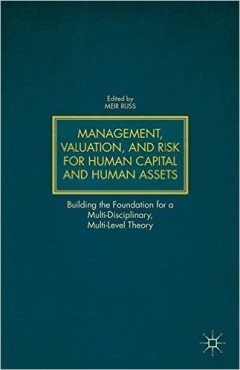
Management, Valuation, and Risk for Human Capital and Human Assets: Building …
Perspectives on Human Capital and Assets goes beyond the current literature by providing a platform for a broad scope of discussion regarding HC&A, and, more importantly, by encouraging a multidisciplinary fusion between diverse disciplines.
- Edisi
- -
- ISBN/ISSN
- 978–1–137–36094–6
- Deskripsi Fisik
- ix, 234 p
- Judul Seri
- -
- No. Panggil
- TXT MG RUS m

The role of the Atlantic corridor project as a form of strategic community of…
This paper aims to summarise the scope, methodology and main findings of a doctoral thesis about business transformation in Latin America taken from a project management (PM) and communities of practice (CoP) perspective.
- Edisi
- Vol. 3 No. 2, 2010
- ISBN/ISSN
- -
- Deskripsi Fisik
- 13 p.
- Judul Seri
- International Journal of Managing Projects in Business
- No. Panggil
- ATC LO WAL t

Collaboration and networking in the process of innovation: the path to precis…
The purpose of this paper is to examine the process of innovation management in the eighteenth century in the context of the search for precision time keeping in the watch making industry. In particular it looks at how knowledge was managed and transferred among interested stakeholders in the process
- Edisi
- Vol. 19 Iss 2 pp. 167 - 188
- ISBN/ISSN
- -
- Deskripsi Fisik
- 24 p.
- Judul Seri
- Journal of Management History
- No. Panggil
- ATC MG PRO c
 Karya Umum
Karya Umum  Filsafat
Filsafat  Agama
Agama  Ilmu-ilmu Sosial
Ilmu-ilmu Sosial  Bahasa
Bahasa  Ilmu-ilmu Murni
Ilmu-ilmu Murni  Ilmu-ilmu Terapan
Ilmu-ilmu Terapan  Kesenian, Hiburan, dan Olahraga
Kesenian, Hiburan, dan Olahraga  Kesusastraan
Kesusastraan  Geografi dan Sejarah
Geografi dan Sejarah